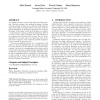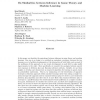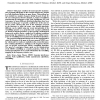234 search results - page 43 / 47 » A polynomial-time nash equilibrium algorithm for repeated ga... |
INFOCOM
2010
IEEE
14 years 10 months ago
2010
IEEE
—We consider the problem of ’fair’ scheduling the resources to one of the many mobile stations by a centrally controlled base station (BS). The BS is the only entity taking d...
SPAA
2003
ACM
15 years 4 months ago
2003
ACM
We consider an online version of the oblivious routing problem. Oblivious routing is the problem of picking a routing between each pair of nodes (or a set of ows), without knowled...
110
click to vote
CCS
2009
ACM
15 years 6 months ago
2009
ACM
In mobile networks, authentication is a required primitive of the majority of security protocols. However, an adversary can track the location of mobile nodes by monitoring pseudo...
107
click to vote
JAIR
2008
14 years 11 months ago
2008
In this paper, we elucidate the equivalence between inference in game theory and machine learning. Our aim in so doing is to establish an equivalent vocabulary between the two dom...
CORR
2008
Springer
14 years 11 months ago
2008
Springer
Abstract--This paper considers the noncooperative maximization of mutual information in the Gaussian interference channel in a fully distributed fashion via game theory. This probl...



